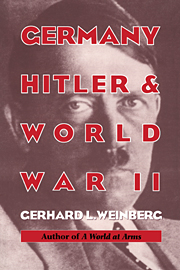Book contents
- Frontmatter
- Contents
- Preface
- Introduction
- Part I Background
- Part II The Nazi system
- Part III Background for war
- Part IV World War II
- 12 German diplomacy toward the Soviet Union
- 13 The Nazi–Soviet pacts of 1939: A half century later
- 14 From confrontation to cooperation: Germany and the United States, 1917–1949
- 15 Pearl Harbor: The German perspective
- 16 Global conflict: The interaction between the European and Pacific theaters of war in World War II
- 17 The “Final Solution” and the war in 1943
- 18 July 20, 1944: The German resistance to Hitler
- 19 D-Day after fifty years: Assessments of costs and benefits
- 20 German plans for victory, 1944–1945
- 21 Reflections on running a war: Hitler, Churchill, Stalin, Roosevelt, Tojo
- 22 Some thoughts on World War II
- 23 A new Germany in a new world
- Appendix: the end of Ranke's history? Reflections on the fate of history in the twentieth century
- Index
12 - German diplomacy toward the Soviet Union
Published online by Cambridge University Press: 05 August 2012
- Frontmatter
- Contents
- Preface
- Introduction
- Part I Background
- Part II The Nazi system
- Part III Background for war
- Part IV World War II
- 12 German diplomacy toward the Soviet Union
- 13 The Nazi–Soviet pacts of 1939: A half century later
- 14 From confrontation to cooperation: Germany and the United States, 1917–1949
- 15 Pearl Harbor: The German perspective
- 16 Global conflict: The interaction between the European and Pacific theaters of war in World War II
- 17 The “Final Solution” and the war in 1943
- 18 July 20, 1944: The German resistance to Hitler
- 19 D-Day after fifty years: Assessments of costs and benefits
- 20 German plans for victory, 1944–1945
- 21 Reflections on running a war: Hitler, Churchill, Stalin, Roosevelt, Tojo
- 22 Some thoughts on World War II
- 23 A new Germany in a new world
- Appendix: the end of Ranke's history? Reflections on the fate of history in the twentieth century
- Index
Summary
This analysis is designed to deal with four aspects of a broad topic: the general aims of Hitler which required a war with Russia for their implementation; his policy toward that country during the years 1933–39; the circumstances under which Hitler decided to invade the Soviet Union and the factors which led to his adhering to that decision; and finally the attack itself and its failure on the field of battle as that relates to earlier German policy choices.
In Vienna, in pre- and postwar Munich, during World War I, and in jail after the failed coup attempt of November 1923 Hitler developed ideas of which only those dealing with foreign relations will be touched on. Convinced that Germany needed more space to feed its population, he rejected a return to the frontiers of 1914 as a sound goal for his movement. He was certain that it would take at least one war and perhaps several to secure the return of the lost territories; in Hitler's eyes that was not worthwhile – if you were going to fight, then you should fight for territorial aims that were worthy of the sacrifices that would be required, and that meant huge stretches of land. The 1914 borders had been inadequate for the old Germany, so the new Germany should formulate its territorial ambitions without reference to them. A notorious American robber was once asked why he robbed banks. His response was, because that's where the money is. Similarly, Hitler argued on the basis of the most obvious geographic considerations that Germany should seize land in Eastern Europe because that's where the land is.
- Type
- Chapter
- Information
- Germany, Hitler, and World War IIEssays in Modern German and World History, pp. 153 - 167Publisher: Cambridge University PressPrint publication year: 1995



